Beyond the KTV parlors and neon cocktail lounges, China has a nightlife culture for those looking for something rougher around the edges. When I was living in China when the term diaosi (loser, underdog) was a title taken with pride. It was to be understated, hip, and carefree. Diaosi around China were headbopping to indie rock at DADA bar, grooving to techno beats at the White Rabbit in Beijing, or taking a trip to the literal underground “Shelter” in Shanghai. While famous bars come and go, there’s always a place to rock out and dance if you know where to look.
After having completed the tourist circuit in Beijing in previous trips, my itinerary was far simpler this time. I spent a few hours at the 798 art space, which is always worth checking out with esoteric installations and fine portraits. I tried to walk past Tiananmen on a rainy day. Not knowing that one needed to register or pack a passport, I was turned back at one of the many police gates. This much state security is bound to produce great punk rock.
School’s Out Forever
Checking out “School Bar” was top of my mind on a Friday night. Getting details on tickets or the lineup was vague, so I showed up to the hutong early and grabbed a bite after checking that tickets at the door were still available. Like any healthy punk lineup, the bill was stacked with four bands playing a mix of oi punk, hardcore, 80s glam metal, and even a few ska tunes.
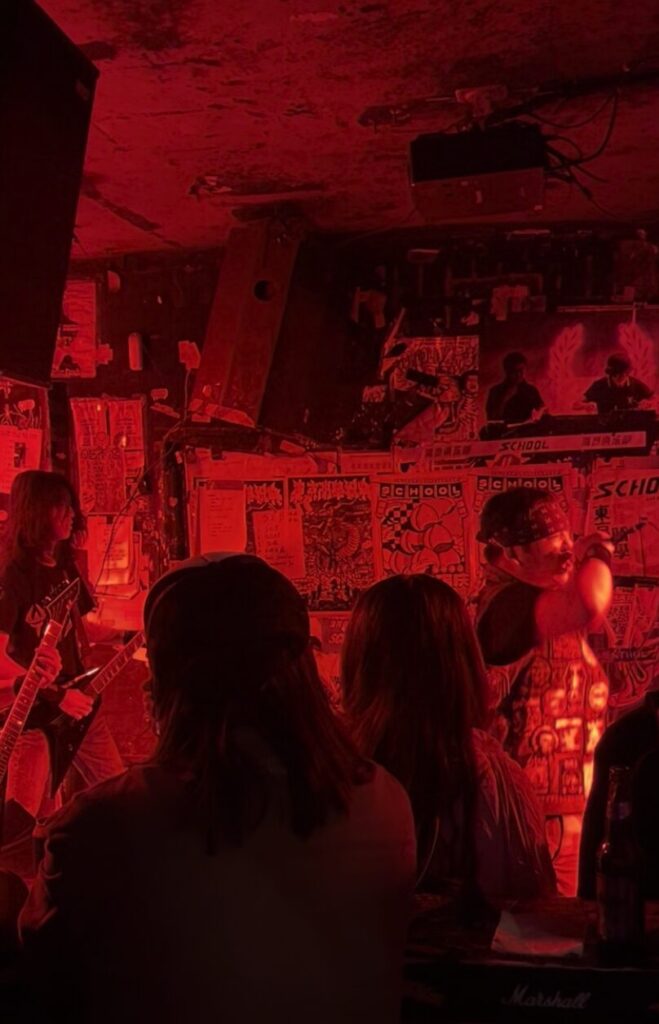
Scene kids with spiky hairdos and leather jackets snuck outside for cigs between sets and swilled from tiny liquor bottles or flasks. Gone were the days of 10-15 RMB bottled beers. Instead, one could find rotating microbrews on and foreign beers on tap in the 35-50 RMB range. The punk standard “beer per set” or for some “2 beers per set” would set you back some serious change, so it made sense for folks to drink outside. Simply not drinking at all was the choice of many young punx who were keen on sweating and slam dancing in the circle pit. I smiled at another laowai with a nod as we moshed for a few minutes in a kind-hearted melee that created a cyclone in the small concrete room.
If you wanted to be someone in the “scene” School Bar is where it’s at. Everyone was hugging and making jokes, and looked like long-time friends of 18 and 50+. Scene “dads” hung about in the upstairs and side lounges smoking and swilling beer or soda, enraptured in conversation with the youth who hung on their every word or looked to them with a twinkle of lust. Like any venue with multiple bands on the bill, bands waited for their set or chilled afterwards, guarding a mountain of gig bags and pedal boards strewn about. I got talking with a local drummer about the venue, and he said, “Punk is here in China in a big way!”
I asked if he’d toured in Chengdu. He said he hadn’t, but our conversation was cut short as he was also part of the headlining band. Oh, how all music scenes around the world thrive by the ever polygamous drummer shared between bands to— beat it— on the drums, of course. It was the dude’s bday, (happy bday, dude!), you can see him blowing out a candle on a tiny cake with all his pals around. 23 years old and already a celebrity in the scene.
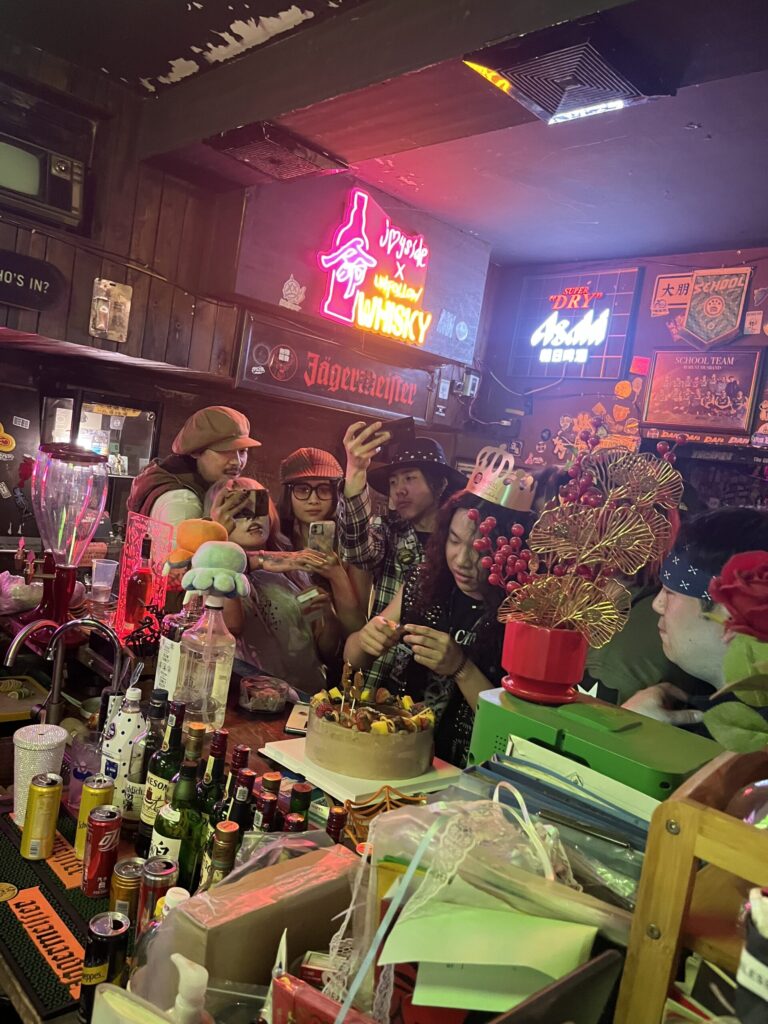
Although China’s punk origin story is based in Wuhan, stemming from the “Wuhan Prison,” Beijing is where it’s at for the modern scene. I can’t imagine many folks want to move back to Wuhan with the pandemic in the background, but maybe it was “Wuhan prison,” the namesake, knowing that a virus from their city would imprison the world! How prophetic those punx might have been!
Searching Southwest
While Beijing may get more of the larger touring acts, Chengdu has always been in on the scene. Little bar, Xiao Jiu Guan, was founded around 25 years ago and remains one of the longest-running underground music venues in the country. While it had a “louder” past and often featured genres that would find a home in School Bar, the venue is also a staple of indie, folk, and new wave. Little Bar also hosts a slew of touring foreign acts.
My friend and owner of New Noise China, has been running tours since 2009 where he started off bringing mid-sized European and American bands to places like Little Bar and Nuts Live House in Chongqing and is now taking talent to Beijing, Shenzhen, and beyond with recent acts like Deafheaven Yussef Days, Trentemøller among others. Jef Vreys is still one of the longest-lasting laowai in Chengdu and a permanent fixture in the music scene across Asia.
Yours truly played Little Bar in 2012. A Facebook memory popped up last week showing me our band flyer of a rainbow-spitting Giant Panda on a skyscraper, reminding me of “this time 13 years ago.” A full rundown of that band and the rock & rave scene of the 2000s can be found in my book Laowhy. Sparked by the memory, I reached out to the singer of that band, and we chatted briefly about his life as a dad in France.
While there wasn’t time to visit Little Bar this time, it was a literal trip down memory lane when I strolled through the Yulin neighborhood. Posters at a museum window dedicated to rock & roll showed gig Posters from Mr Chelonian, Soundtoy, Mosiac, The Subs, and other local bands from 2008-2000teen era. I’d seen most of those bands and helped prop up many a crowd surfer in tiny bars and big festivals like Zebra and One Love.
Walking through my old ‘hood in Yulin brought back nostalgia of a much simpler age, hitting me right in the “feels.” While I longed to step back in time, the scene came alive when I stopped back in Jah Bar. This is a holy place.
A photo from Jah Bar was my last photo taken in China before I left in the summer of 2012. That night was a monumental send-off shortly after my birthday when I jammed with all my favorite guitarists and drummers from China, Britain, Germany, France, and the U.S.A. Skateboarders did kick flips in the street, and the diaosi smoked you know what along the river or in rattan chairs deep in cloud nine conversations instead of staring at their phones or laptops at the bar.
A drum set sits on stage with amps and guitars for free use. Li Li, the original owner and jam master extraordinaire, has since left Chengdu to live the life of a surfer. The community he and his (now) ex-wife created is a crucial habitat for nourishing underground music in China. While I griped about the kids and their screens in the bar, there were other huddles of hip dudes and dudettes selling vintage clothes, silver jewelry, incense, or band merch.
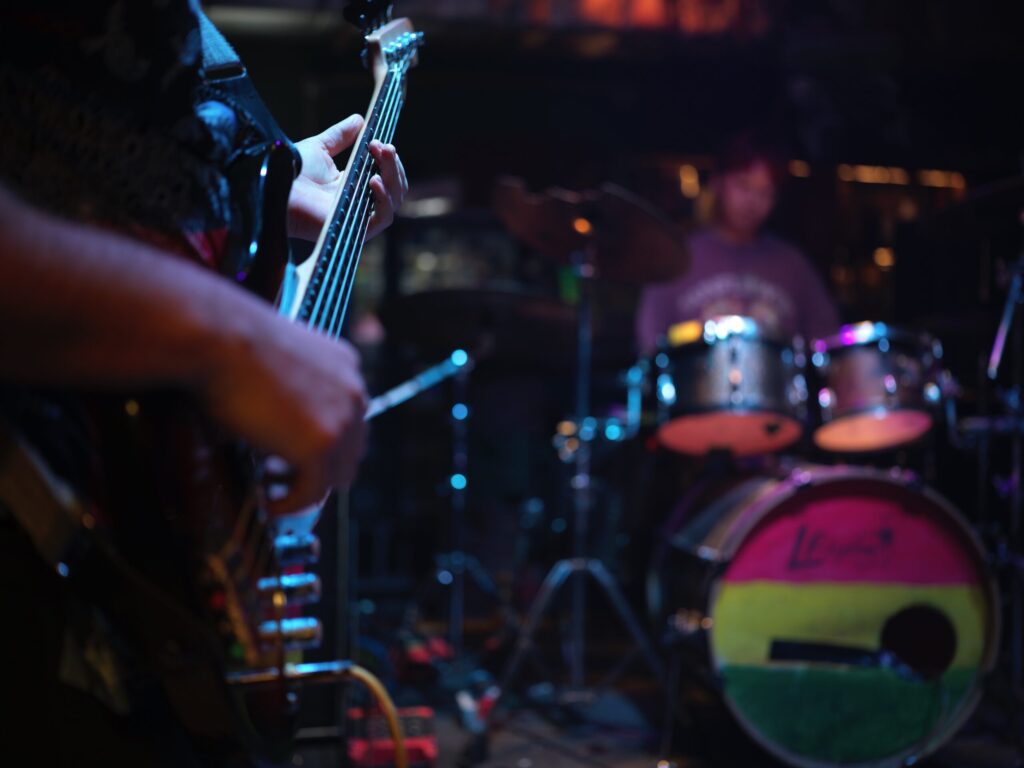
Tibetans and Han Chinese still shared drinks and smokes (no more open air weed), laughing by the street side bar or watching the live jams. It’s a place of unity under funk, rock, reggae, metal, or a mashup of all the above if people are noodling.
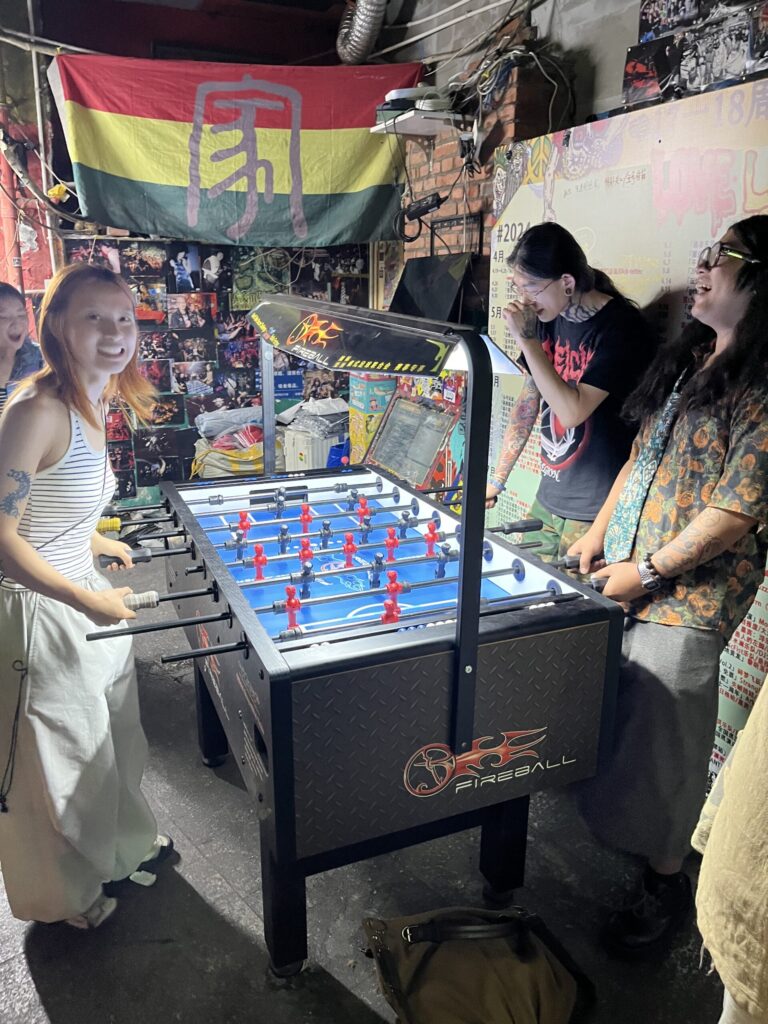
Making Friends in the Scene
Jah Bar is a hub for touring bands, but like any hippie venue, it can be hard to convince folks to buy a ticket. At 100 RMB entry for a 45-minute set, I too was kinda’ on the fence. But I decided to support the scene, and was glad to have caught the set by Nemassle band 匿名私聊, which translates to “anonymous private chat.” Was it a dig at the system? I didn’t ask, but I did buy the guys a round of beers (Only tiny IPAs, no more giant Qingdao’s!) The great thing about not knowing the band (or peeping their SoundCloud/ Bandcamp as I do for shows stateside) is that I had absolutely no idea what to expect.
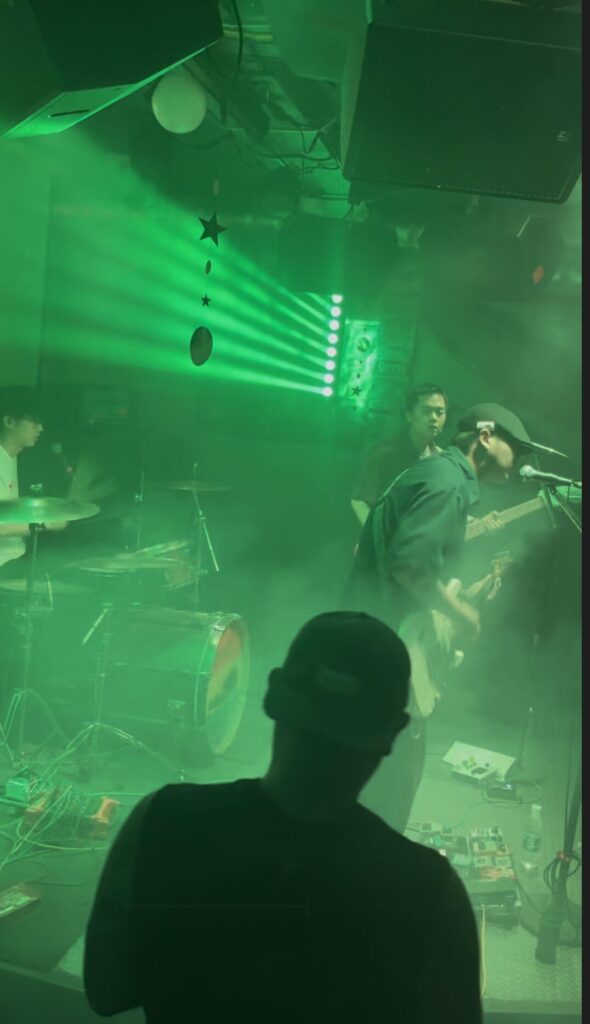
These guys sounded like a mix of early Rancid and pscyhe rock. The bass was killer, and they looped in for gang vocals to keep the energy up. They swapped instruments at least once and adventured into some trippy jams with heavy use of chorus and delay.
On another night at Jah, I shared street food with members of 鸡毛大乐队 (@Jimaobigband on Instagram) an artsy yet polished quartet. Their lead singer encouraged me to eat, “Too spicy for me, man, I’m from Hangzhou.” We chatted in a mix of Chinese and English about the music scene and finding purpose in life. The lead singer, whose WeChat name is “Bu Gao Xing” (un happy) explained that they were in town for a concert in Wenjiang.
“Wenjiang?”I laughed, for that’s where I was suckered into teaching English to 45 kindergarteners in 2008 to repay my study abroad advisor when I lost my bank card and needed to be bailed out with a flight home from Xinjiang. They laughed at the story. I explained that no, it wasn’t the Uyghurs who robbed me. My damn wallet fell out of my pants after taking out cash to buy a ticket to Kashgar. We chatted about Xinjiang briefly, “good people there, they don’t have many options in life,” they claimed before we headed back in to jam with their pianist on keys, and Bu Gao Xing on guitar and drums. I hadn’t listened to their music much during the trip, but really dug into their catalog during the last week.
I find myself describing their music as if David Lynch’s “Lost Highway” smoked a joint with Frank Zappa’s Mothers of Invention with a cool high hat beat. I wonder what Bu Gao Xing will think about that hot take—better hit him up again on WeChat.
Connecting through sporadic jams and appreciating live music is what the scene is all about. Here’s the kicker, the seemingly anonymous laowai I saw in School Bar in Beijing ran into me at Jah and we jammed. Little did I know he was a talented drummer from Philly searching far and wide for the coolest spots in China. We exchanged info, and he’s working on a video that I’ll be sure to link. Bu Gao Xing and his bandmates were warm souls and welcomed me to visit Hangzhou to chill and play music on my next trip. I already have four years of musical memories ingrained during my unofficial residency at Jah. In just three nights, I met a handful of new musical friends, local graffiti artists, metal heads, and all-around cool dudes.
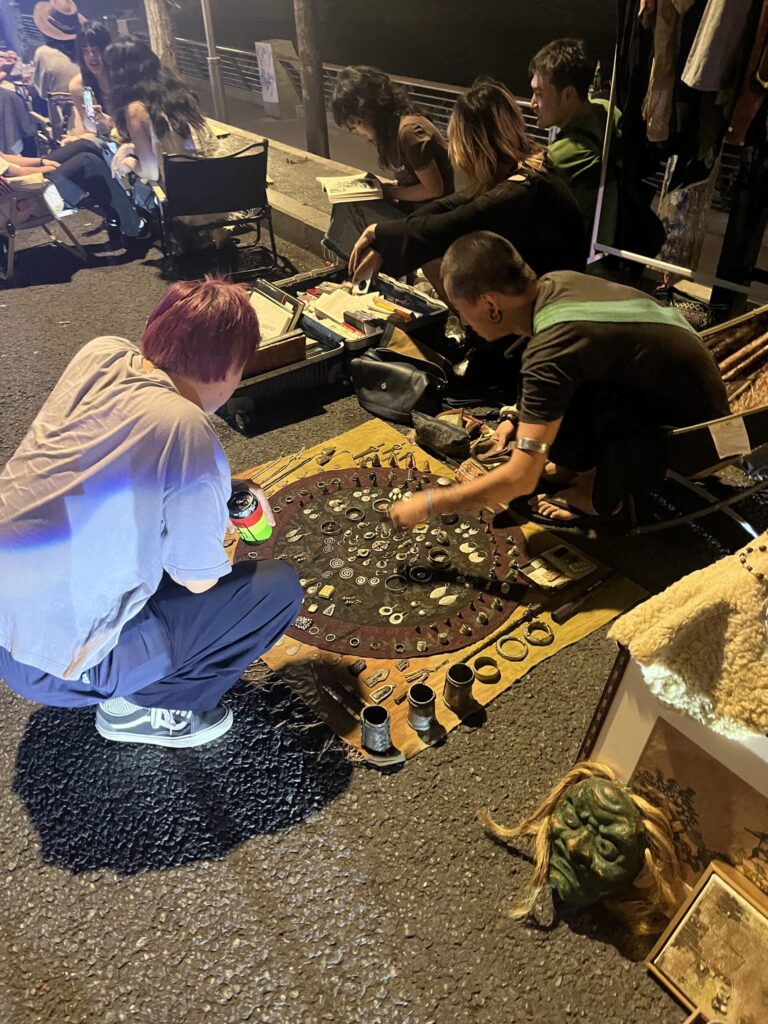
China’s rock scene is far wider than the bars and clubs mentioned here. The rockers are no longer in hiding. The punx, hippies, and skaters are spreading out to all corners of the “middle kingdom,” proudly waving a middle finger to the party’s grasp for complete control.
Together they’ll fight for the right, to paaaartay!
Have you been to Jah Bar or School Bar lately?
Hit me up at anders.oskar.writes@gmail.com or on socials.
Up the punx,
Anders
